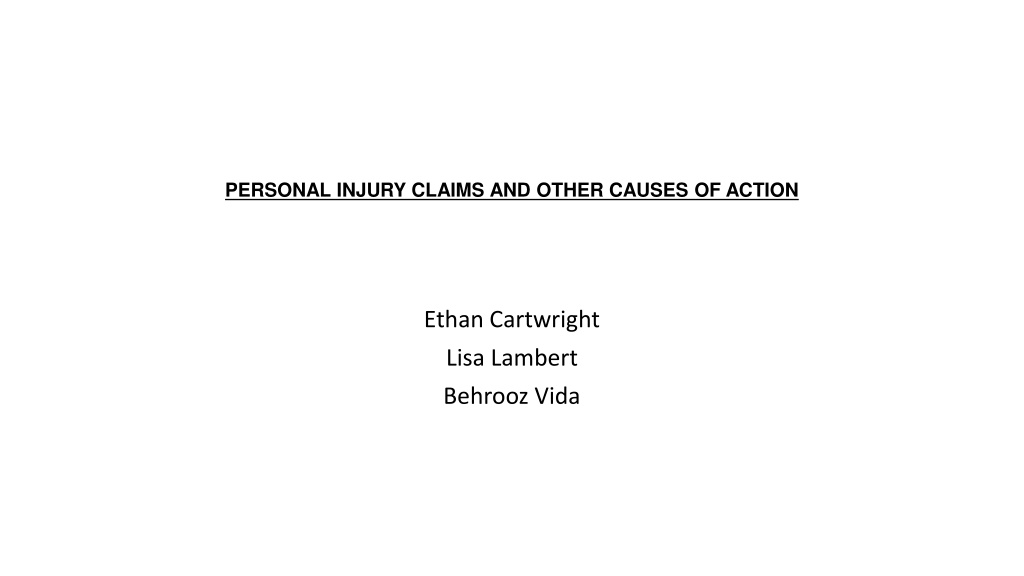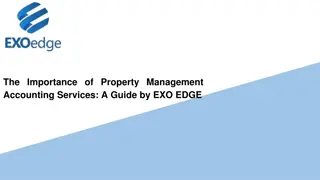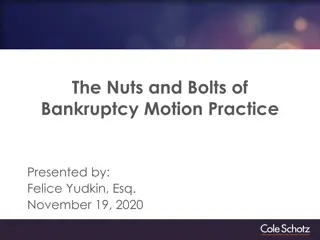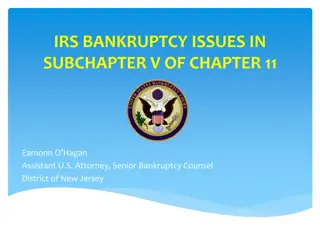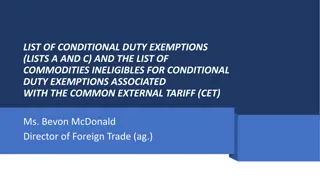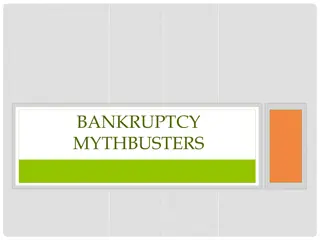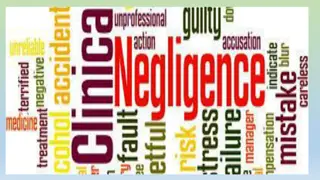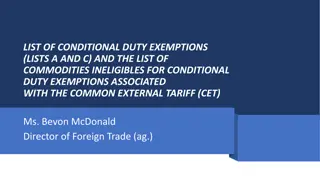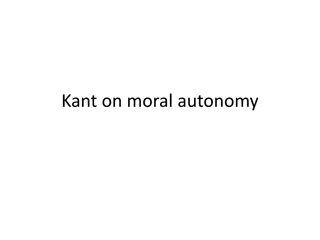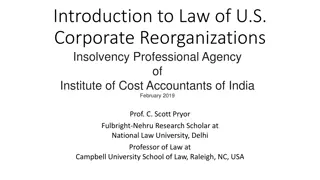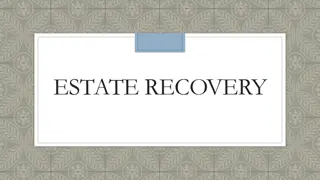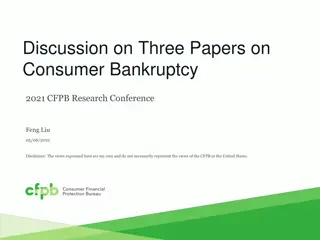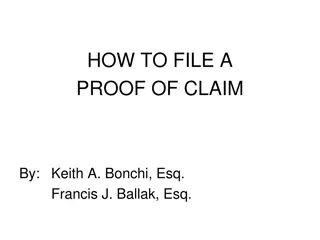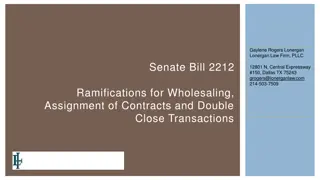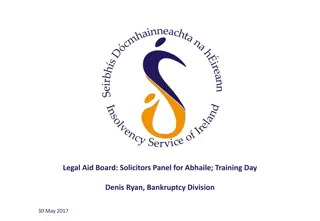Duty to Disclose Property of the Estate in Chapter 13 Bankruptcy
Chapter 13 debtors have a legal obligation to disclose all assets, including post-petition causes of action, during bankruptcy proceedings. Failing to disclose such assets can result in detrimental consequences, such as being barred from pursuing claims post-bankruptcy. It is crucial for debtors to continuously update and disclose any new assets acquired throughout the bankruptcy process to avoid potential legal issues.
Download Presentation

Please find below an Image/Link to download the presentation.
The content on the website is provided AS IS for your information and personal use only. It may not be sold, licensed, or shared on other websites without obtaining consent from the author. Download presentation by click this link. If you encounter any issues during the download, it is possible that the publisher has removed the file from their server.
E N D
Presentation Transcript
PERSONAL INJURY CLAIMS AND OTHER CAUSES OF ACTION Ethan Cartwright Lisa Lambert Behrooz Vida
Duty to Disclose Property of the Estate Potential causes of action are assets that must be disclosed. In re Coastal Plans, Inc., 179 F.3d 197, 208 (5th Cir. 1999). Whether arising before or after the petition, a Chapter 13 debtor s causes of action are property of the estate. Fleet v. United States Consumer Council, Inc., 53 B.R. 833 (Bankr. E.D. Pa. 1985) (Debtors causes of action, whether they arise prepetition or post-petition, are property of the Chapter 13 estate by virtue of 1306(a).). Debtors have a duty to disclose all interests in property, however fractional, even if debtors believe such interest is not part of the bankruptcy estate. In re Robinson, 292 B.R. 599, 607 (Bankr. S.D. Ohio 2003). A debtor has a continuing obligation to disclose post-petition claims, causes of action, and assets. United States v. Beard, 913 F.2d 193,197 (5th Cir. 1990). 2
Duty to Disclose Property of the Estate Property of the estate includes all property acquired by the debtor during the bankruptcy proceeding. A claim in favor of the debtor arising after the filing of the Chapter 13 bankruptcy petition but before the bankruptcy is closed is considered after-acquired property that is part of the estate. The duty to amend Chapter 13 bankruptcy schedules is clear. A debtor may not conceal property belonging to the estate. A debtor has an affirmative duty to supplement the list of assets with any claims arising during the pendency of the bankruptcy proceeding. Failure to timely amend or supplement the list of assets amounts to a denial that such a claim exists. A debtor that fails to amend Schedule B to disclose a post-petition cause of action may be barred by the principle of judicial estoppel from pursuing the claim after the bankruptcy proceeding is closed. Wolfork v. Tackett, 526 S.E.2d 436, 437 38 (Ga. Ct. App. 1999), aff d, 540 S.E.2d 611 (Ga.), cert. denied, 534 U.S. 819, 122 S. Ct. 51, 151 L. Ed. 2d 21 (2001). 3
Duty to Disclose Property of the Estate A Chapter 13 debtor has a continuing duty to disclose even a post-petition cause of action because debtors have an express, affirmative duty to disclose all assets even if there is uncertainty about if those assets are property of the estate. Even on the advice of counsel not to disclose an asset, claim, or cause of action, the nondisclosure on the advice of counsel does not exculpate the debtor if there was a motive to conceal. In re Flugence, 738 F.3d 126, 129 n.1 (5th Cir. 2013). A debtor s lack of knowledge of the statutory duty to disclose will not excuse the nondisclosure as inadvertent. In re Coastal Plains, Inc., 179 F.3d 197 (5th Cir. 1999). At the commencement of a chapter 13 proceeding, an estate is created that continues to exist until the proceeding is closed, dismissed, or converted, and any assets the chapter 13 debtor acquires after commencement but prior to discharge must be disclosed to the bankruptcy court. Woodard v. Taco Bueno Restaurants, Inc., 2006 WL 3542693 (N.D. Tex.). Disclosure and reservation of claims in a chapter 12 plan was sufficient to avoid estoppel. In re Artho, 587 B.R. 866 (Bankr. N.D. Tex. 2018). 4
Vesting Vesting Absent language in the plan or confirmation order excepting assets from vesting in debtor upon confirmation of the plan, Trustee could not modify the plan after confirmation to take proceeds related to a cause of action that existed pre-petition which had vested in the debtor at confirmation. In re Hazelwood, 570 B.R. 557 (Bankr. N.D. Tex. 2017). Even after the case is closed, the estate continues to retain its interest in unscheduled property. See 11 U.S.C. 554(d); Kane, 535 F.3d at 385; Parker v. Wendy's Int'l, Inc., 365 F.3d 1268, 1272 (11th Cir.2004); 5 Collier 554.03 at 14. Vest as used in 1327 means the granting of an immediate and fixed right in the debtor to enjoy all of the assets of the bankruptcy estate free and clear once he faithfully completes his obligations under the plan and is entitled to receive a discharge. Woodard v. Taco Bueno Restaurants, Inc., 2006 WL 3542693 (N.D. Tex.). 5
Vesting Vesting Currently in the Northern District of Texas, confirmation does not vest property in the debtor under 1327(b). The local form Chapter 13 Plan provides: 6
Vesting Vesting Likewise, the form confirmation order provides: IT IS FURTHER ORDERED in addition to the provisions of Section II, paragraph T of the Plan, that unless otherwise ordered by the Court, unscheduled and/or undisclosed property as well as after acquired property pursuant to 11 U.S.C. 1306(a)(1) shall not re-vest in Debtor upon confirmation pursuant to 11 U.S.C. 1327(b) and as provided in the Plan. IT IS FURTHER ORDERED that the Debtor shall not dispose of or encumber any non-exempt property prior to discharge without consent of the Trustee or order of the Court after notice to the Trustee and all creditors. 7
Exemptions Under the Federal exemption scheme, there may be several available exemptions under 522(d) to protect the debtor s interest in a claim depending on the nature of the underlying cause of action including: (5) The debtor's aggregate interest in any property, not to exceed in value $1,475 [originally $800 , adjusted effective April 1, 2022]1 plus up to $13,950 [originally $7,500 , adjusted effective April 1, 2022]1 of any unused amount of the exemption provided under paragraph (1) of this subsection. (10) The debtor's right to receive-- (A) a social security benefit, unemployment compensation, or a local public assistance benefit; (B) a veterans' benefit; (C) a disability, illness, or unemployment benefit; (D) alimony, support, or separate maintenance, to the extent reasonably necessary for the support of the debtor and any dependent of the debtor; (E) a payment under a stock bonus, pension, profitsharing, annuity, or similar plan or contract on account of illness, disability, death, age, or length of service, to the extent reasonably necessary for the support of the debtor and any dependent of the debtor, unless-- (i) such plan or contract was established by or under the auspices of an insider that employed the debtor at the time the debtor's rights under such plan or contract arose; (ii) such payment is on account of age or length of service; and (iii) such plan or contract does not qualify under section 401(a), 403(a), 403(b), or 408 of the Internal Revenue Code of 1986. (11) The debtor's right to receive, or property that is traceable to-- (A) an award under a crime victim's reparation law; (B) a payment on account of the wrongful death of an individual of whom the debtor was a dependent, to the extent reasonably necessary for the support of the debtor and any dependent of the debtor; (C) a payment under a life insurance contract that insured the life of an individual of whom the debtor was a dependent on the date of such individual's death, to the extent reasonably necessary for the support of the debtor and any dependent of the debtor; (D) a payment, not to exceed $27,900 [originally $15,000 , adjusted effective April 1, 2022],1 on account of personal bodily injury, not including pain and suffering or compensation for actual pecuniary loss, of the debtor or an individual of whom the debtor is a dependent; or (E) a payment in compensation of loss of future earnings of the debtor or an individual of whom the debtor is or was a dependent, to the extent reasonably necessary for the support of the debtor and any dependent of the debtor. 8
Exemptions Exemptions The Texas exemption scheme is more restrictive. Debtor s may be limited to exempting causes of action to the extent that they are based on unpaid wages or commissions, public benefits, child support, spousal maintenance, and some types of insurance proceeds. TEX. PROP. CODE 42.001(b)(1) & (3), TEX. HUM. RES. 31.030 & TEX. INS. CODE 1108.051, et al. 9
Conversion to Chapter 7 Conversion to Chapter 7 When a debtor converts from Chapter 13 to Chapter 7, property or interests in property debtor is eligible to receive within 180 days of commencement of the case becomes property of the estate. In re Guentert, 206 B.R. 958, 962 (Bankr. W.D. Mo. 1997). Property acquired after filing a Chapter 13 petition that remains in possession of the debtor does not generally become property of the Chapter 7 estate upon conversion. But when a debtor converts a Chapter 13 case in bad faith, the after-acquired property does become property of the Chapter 7 estate. In re Castillo, 508 B.R. 1 (W.D. Tex. 2014). 10
Special Counsel Special Counsel Full disgorgement of attorneys fees should be the default sanction for failure to comply with 329. SE Prop. Holdings, LLC v. Stewart (In re Stewart), 970 F.3d 1255, 1267 (10th Cir. 2020). Special counsel s failure to comply with 329 and FED. R. BANKR. P. 2016 by filing a statement of compensation paid or agreed to be paid for services rendered in connection with the case within 14 days after the petition date or within 14 days after any payment or agreement not previously disclosed resulted in disgorgement of attorney s fees and expenses earned in connection with a personal injury settlement. In re Smith, 637 B.R. 758 (Bankr. S.D. Ga. 2022). Full disgorgement of attorney s fees is the default sanction for attorneys noncompliance with 329 and Rule 2016. In re Rosales, 621 B.R. 903 (Bankr. D. Kan. 2020). Many courts, perhaps the majority, punish defective disclosure by denying all compensation. In re Gorski, 519 B.R. 67 (Bankr. S.D.N.Y. 2014). 11
Additional Fee for Settlement Approval Additional Fee for Settlement Approval General Order 2021-05 paragraph 21(g)(8)(G) also provides for an Additional Fee of $450.00 for (G) Preparation of and representation of the Debtor regarding any motion to approve a compromise and settlement agreement filed in the Case related to the settlement of an adversary proceeding or a matter pending in a court other than the bankruptcy court. 12
After Completion of the Plan After Completion of the Plan While a cause of action that accrued after confirmation but prior to closing was property of the estate even though debtor was not aware of any potential award until after the case was closed, Trustee could not modify the plan to increase the dividend to creditors after completion of plan payments absent a showing that debtors failed to act in good faith. In re Powers, 435 B.R. 385 (Bankr. N.D. Tex. 2010). Trustee could not modify plan to account for newly acquired funds after receiving all plan payments from debtors. In re Stanke, 638 B.R. 571 (Bankr. N.D. Tex. 2022). 13
Judicial Estoppel Judicial Estoppel Judicial estoppel is a common law doctrine that prevents a party from assuming inconsistent positions in litigation. In re Superior Crewboats, Inc., 374 F.3d 330, 334 (5th Cir. 2004). The elements of judicial estoppel are: (1) the party against whom judicial estoppel is sought has asserted a legal position which is plainly inconsistent with a prior position; (2) a court accepted the prior position; and (3) the party did not act inadvertently. Jethroe v. Omnova Solutions, Inc., 412 F.3d 598, 600 (5th Cir. 2005). Debtor's failure to satisfy its statutory disclosure duty is inadvertent only when, in general, the debtor either lacks knowledge of the undisclosed claims or has no motive for their concealment. In re Coastal Plains, Inc., 179 F.3d 197 (5th Cir. 1999). 14
Judicial Estoppel Judicial Estoppel Judicial estoppel does not bar a blameless bankruptcy trustee from pursuing a judgment that the chapter 7 debtor concealed and is estopped from pursuing. Reed v. City of Arlington, 650 F.3d 571 (5th Cir. 2011). In bankruptcy, estoppel is appropriate when a debtor fails to disclose and asset to a bankruptcy court, but then pursues a claim based on that undisclosed asset. Love v. Tyson Foods, Inc., 677 F.3d 258, 261 (5th Cir. 2012). Breach of contract claim was not barred where debtor disclosed a partnership agreement in bankruptcy, but not the potential right to reinstate the partnership interest when all creditors were paid in full. Asarco, LLC v. Montana Resources, Inc., 858 F.3d 949 (5th Cir. 2017). 15
